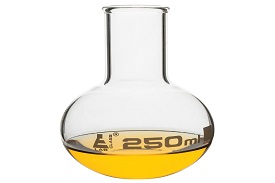
Narrow-necked boiling flasks are a specialized type of laboratory glassware designed for heating and boiling liquids in a controlled manner. These flasks have a distinctive shape characterized by a long, slender neck and a rounded or bulbous base. The narrow neck allows for precise control over the release of vapours and minimizes the risk of splashing during boiling or reactions. The elongated neck also helps to reduce the loss of volatile substances through evaporation. Narrow-necked boiling flasks are commonly used in distillation setups and reflux reactions, where controlled heating and condensation of vapours are crucial. Their design makes them well-suited for applications in organic chemistry, providing scientists with the necessary control and precision during various laboratory processes.
All laboratory glassware – narrow-necked boiling flasks has been included in the mandatory ISI Certification Scheme under IS 1381 (Part 1): 2003.
This Indian standard outlines the criteria and dimensions for a globally recognized range of laboratory flasks, including conical, flat-bottom and round-bottom flasks. These flasks are intended for direct use in laboratories, either independently or in conjunction with other equipment for general laboratory purposes. Additionally, they are suitable for further processes leading to the creation of other products.
This product cannot be exported, imported, or sold in the Indian consumer market without bearing the ISI Mark.
Indian Standards Institute, or ISI was renamed the Bureau of Indian Standards (BIS) in 1987. The official mark that the Bureau of Indian Standards provides for manufacturers of various goods is the ISI Mark. It is used to indicate compliance with Indian standards (IS) set by the Bureau of Indian Standards (BIS) and has been used as a conformity marking for industrial products. Manufacturers received permission from BIS to use the ISI Mark on items that comply with relevant Indian requirements through the product certification program.
Only manufacturers (domestic or foreign) who produce the finished product will be awarded ISI Certification. This will not be given to any product importers, traders, dealers, or distributors.
The following documentation is required to get an ISI certification:
For more detailed information, please click here.
There are two approaches for Indian manufacturers to become certified with the ISI Mark:
Regular Procedure
With the possible exception of cases deemed "All India first," which might take up to 180 days, the licensing procedure is expected to be finished in 120 days. This timeline starts on the day the application is received, assuming that at different points in time the documentation, unit assessment, and product conformance are all deemed acceptable.
Step 1: Manufacturing Unit Customization in Compliance with Applicable Indian Standards
Step 2: Submission of the Application Form
For more detailed information, please click here.
Simplified Procedure
This is a much faster process than the standard procedure. After a factory inspection is deemed satisfactory and the initial evaluation establishes that the sample complies with the applicable Indian Standard(s), the license application process is expected to be finished in 30 days.
Step 1: Adapting the Manufacturing Unit to Comply with the Relevant Indian Standard
Step 2: Sample Testing
For more detailed information, please click here
The process of obtaining ISI Mark Certification for Foreign Manufacturers typically includes the following steps:
Step 1: Application
Step 2: Query Raised (If Any)
For more detailed information, please click here.
Brand Liaison provides helpful support for achieving ISI Mark Certification. Among our offerings are:
Please click here to get in contact with our team of specialists for a deeper explanation of the paperwork and steps needed to get ISI Mark Certification.